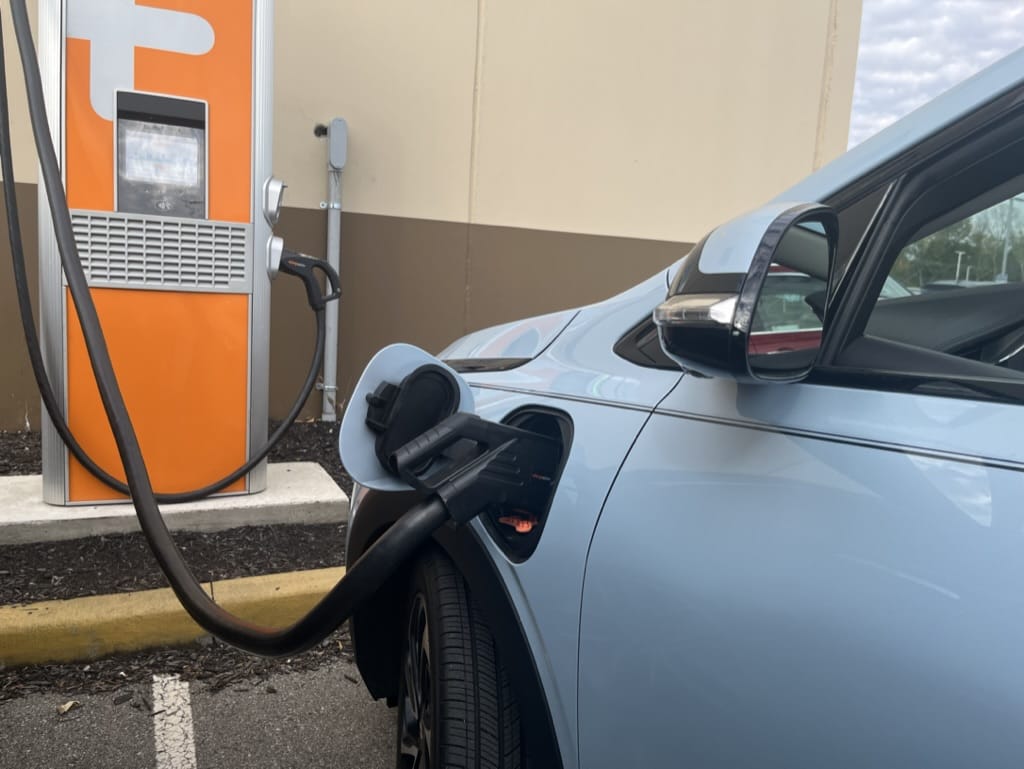Statewide coalition outlines equity and accessibility concerns with EV infrastructure plan
(INDIANA CAPITAL CHRONICLE) — A statewide coalition is calling on the Indiana Department of Transportation (INDOT) to address its equity and accessibility concerns with a plan to incentivize EV chargers in Indiana.
In a Tuesday press release, the Indiana Alliance for Equity, Diversity and Inclusion of Electric Vehicle Infrastructure and Economic Opportunities — an alliance of Black organizations across the state — said INDOT should address several gaps in its draft National Electric Vehicle Infrastructure (NEVI) program.
“As communities that have been historically and pervasively discriminated against in ways that have all but foreclosed the equal enjoyment of our rights under law, we demand that INDOT ensure meaningful public participation and engagement throughout the project planning and development process,” Jorden Giger, co-founder of Black Lives Matter South Bend, said in the release.
In September 2022, the federal government approved funding for INDOT’s statewide electric vehicle charging network under the NEVI program. Under this program, the state will receive around $100 million to build this network along Indiana interstates and highways.
The alliance had previously asked the federal government to reject INDOT’s plan, arguing the planning process was flawed and did not include voices from underserved and impacted communities. When funding was approved, the group said it was “disappointing.”
“They must continually evaluate the impacts and benefits of these programs in light of the demographics of affected communities to avoid disparate impacts and provide equitable access to benefits,” Giger said.
Natalie Garrett, INDOT’s strategic communications director, said in a statement to the Indiana Capital Chronicle that the agency is currently reviewing all comments received “and remains committed to the equitable expansion of EV charging infrastructure through its Changing the Crossroads program. The project team is continuing stakeholder engagement and collaboration efforts as the program advances.”
Key concerns
According to the release, one of the Alliance’s main concerns was that INDOT’s plan did not incorporate the Federal Highway Administration’s equity requirements, such as detailing the specific metrics used to ensure equity in planning. However, the plan does align with the Justice40 Draft Implementation Plan, a federal government effort to ensure that at least 40% of the overall benefits from climate and clean energy investments benefit disadvantaged communities.
The alliance said it was “problematic” that INDOT hosted only one event with stakeholders during its drafting process. According to INDOT’s website, it hosted a “NEVI Stakeholders” meeting on Tuesday, May 23, 2023. The group criticized INDOT for holding the meeting “one time, in one location, and in the middle of the work day.” However, INDOT’s website states the agency has hosted five other in-person and virtual meetings for the public, in addition to three other stakeholder meetings “to allow stakeholders across Indiana to provide feedback on the state’s Electric Vehicle Infrastructure Deployment Plan.”
Garrett said that the agency released a draft of its Justice40 Implementation Plan on Monday, which outlines the state program’s equity considerations to help ensure benefits are aligned with the federal Justice40 initiative. Public comment on the plan will be accepted until Aug. 28, and people can share feedback here.
“INDOT continues to implement Charging the Crossroads in compliance with all federal requirements related to the National Electric Vehicle Infrastructure (NEVI) program,” Garrett said.
The group also asserts that INDOT did not include enough detail while referencing events and surveys used to reach disadvantaged communities in its report such as which organizations it met with, the feedback received and how the input was incorporated.
Additionally, the group argues INDOT should ensure disadvantaged communities benefit from the economic and health benefits of the NEVI program before even installing EV charging stations.
“It must engage our communities now, to remedy the harms we have already and continue to suffer from inequitable distribution of publicly-funded projects,” the release continues.
INDOT’s draft states that it will “continue to promote the use of small, minority-owned, and women-owned businesses” when selecting sites to build EV chargers. However, the alliance believes the plan does not go far enough to incorporate equity concerns, and asked INDOT to prioritize local businesses and nonprofit organizations in its site selection.
The alliance submitted its concerns and public comment to INDOT in a July 25 letter to INDOT Commissioner Michael Smith and Indiana Office of Energy Development Executive Director Ryan Hadley.



